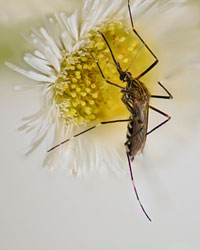
Mission
The Center for Vector Biology (CVB) is dedicated to studying insects and arachnids, particularly mosquitoes and ticks, that profoundly impact public health by transmitting disease causing agents such as viruses and bacteria (being disease vectors) or being a significant public nuisance. In New Jersey, thousands suffer from tick-borne Lyme disease annually, making tick-borne pathogens the fastest-growing cause of infectious diseases in the northeastern United States. Our center's scientists engage in both fundamental and applied research to deepen our understanding and effectively address these critical societal challenges. The majority of CVB's faculty and students are affiliated with Rutgers University's Department of Entomology, as well as Plant Sciences, Ecology & Evolution, and the School of Public Health.
Role
Center researchers play a pivotal role in interpreting and disseminating surveillance data gathered by NJ county agencies on mosquito vectors and their infection rates with pathogens such as West Nile virus and eastern equine encephalitis virus, among others. They are frequently sought out by the media to provide expert insights and guidance following the detection of new vectors species and during vector-borne disease outbreaks at local, national, and international levels.
Collaborations
One exemplary collaboration is embodied by Dr. Andrea Egizi, the lead scientist at the Monmouth County Tick-borne Diseases Lab within Rutgers CVB. This collaboration has enhanced tick research at CVB, coinciding with the discovery of the Asian longhorned tick in New Jersey in 2017, showcasing the tangible benefits of partnerships between CVB and county programs.
